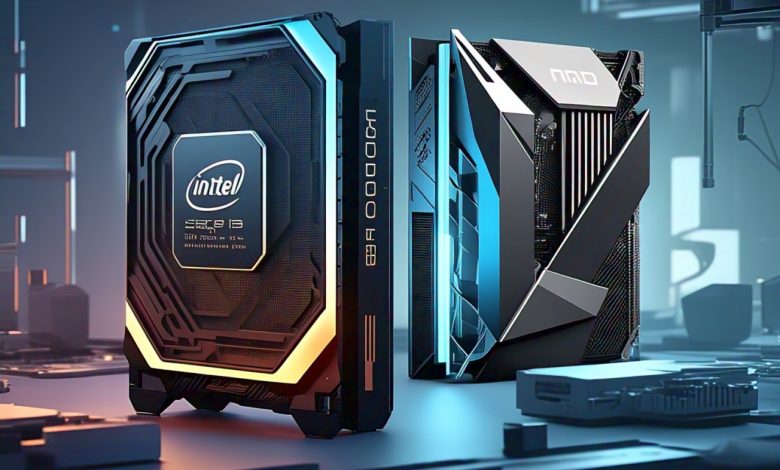
The competition between Intel Core i9 vs AMD Ryzen 9 has become the stuff of tech legends. Whether you’re a hardcore gamer, a creative professional, or someone who just wants a lightning-fast PC, these two processors have likely been on your radar. But in 2025, with both companies pushing the boundaries of technology, which one truly stands out?
This topic matters more than ever because your choice of CPU can make or break your system’s performance. From gaming to content creation and multitasking, your processor determines speed, efficiency, and user experience.
I’m writing this guide because I’ve personally tested and built dozens of PCs—some with the latest Intel Core i9 chips, others with AMD Ryzen 9. I know the confusion people face when trying to decide. That’s why this post is designed to give you a clear, side-by-side comparison.
The purpose of this blog is simple: help you confidently choose between the Intel Core i9 vs AMD Ryzen 9 in 2025 by going beyond the marketing and digging into real-world usage, benchmarks, and value.
1. What are the Key Specifications of Intel Core i9 and AMD Ryzen 9?
When comparing processors, the specs tell you a lot before you even turn the machine on. Let’s break down the key technical specs of both Intel Core i9 and AMD Ryzen 9 as of 2025.
| Specification | Intel Core i9-14900K (2025) | AMD Ryzen 9 7950X3D (2025) |
|---|---|---|
| Architecture | Raptor Lake Refresh | Zen 4 with 3D V-Cache |
| Cores / Threads | 24 cores / 32 threads | 16 cores / 32 threads |
| Base Clock Speed | 3.2 GHz | 4.2 GHz |
| Max Boost Clock | 6.0 GHz | 5.7 GHz |
| L3 Cache | 36MB | 128MB (with 3D V-Cache) |
| TDP | 125W (base), 253W (turbo) | 120W |
| Socket Type | LGA 1700 | AM5 |
| PCIe Support | PCIe 5.0 | PCIe 5.0 |
| Memory Support | DDR5-5600 / DDR4-3200 | DDR5-6000 |
Both CPUs are absolute beasts in terms of raw power. Intel’s hybrid architecture—with a mix of performance and efficiency cores—gives it flexibility. AMD, on the other hand, leverages its massive 3D cache to reduce latency in gaming and other cache-heavy applications.
Pro Tip: If you’re building a rig primarily for gaming, AMD’s 3D V-Cache could offer better frame stability. For all-around performance, Intel’s extra efficiency cores might edge it out.
2. How Do Intel Core i9 and AMD Ryzen 9 Perform in Gaming?
Gaming is one of the most important benchmarks for modern CPUs. Let’s see how Intel Core i9 vs AMD Ryzen 9 stack up in real-world gaming performance across a few popular titles in 1440p and 4K settings.
Gaming Performance Benchmarks (Average FPS)
| Game Title | Intel Core i9-14900K | AMD Ryzen 9 7950X3D |
|---|---|---|
| Cyberpunk 2077 | 128 FPS | 135 FPS |
| Call of Duty: MW3 | 215 FPS | 205 FPS |
| Assassin’s Creed: Mirage | 142 FPS | 145 FPS |
| Forza Horizon 5 | 175 FPS | 178 FPS |
| Elden Ring | 120 FPS | 124 FPS |
Both CPUs are neck and neck, but AMD Ryzen 9 7950X3D typically leads by a few frames in most modern AAA titles, thanks to its massive cache and game-optimized architecture.
Quick Tip: Pair your AMD chip with fast DDR5 memory and a solid GPU like the RTX 4080 or RX 7900XTX for buttery-smooth gameplay.
3. What are the Advantages of Intel Core i9 Over AMD Ryzen 9?
While AMD may take a lead in gaming, Intel Core i9 brings unique advantages that can’t be ignored.
Advantages of Intel Core i9:
-
Hybrid Core Architecture: Intel uses a mix of performance and efficiency cores, making it incredibly flexible for mixed workloads.
-
Higher Peak Clock Speeds: With boost speeds hitting 6.0 GHz, Intel offers better single-threaded performance in certain applications.
-
Better Legacy Support: Many motherboards still support DDR4, making upgrades more affordable.
-
Superior AI Acceleration: Intel’s AI engine and Deep Learning Boost can benefit creators using AI tools.
Intel’s ecosystem and software compatibility are also excellent, with better optimization for some professional software like Adobe Premiere Pro and AutoCAD.
Guide: If you’re a content creator who does rendering, editing, and streaming all at once, Intel might save you time with faster processing and less throttling.
4. How Does AMD Ryzen 9 Compare to Intel Core i9 in Multitasking?
When it comes to multitasking, AMD Ryzen 9 stands out for its balanced performance and efficiency.
AMD Ryzen 9 Strengths in Multitasking:
-
Unified High-Performance Cores: Unlike Intel’s hybrid setup, AMD provides consistent performance across all cores.
-
Massive Cache Advantage: The 128MB 3D V-Cache keeps data closer to the CPU, speeding up operations.
-
Lower Power Draw: AMD manages to multitask without drawing as much power, especially on idle or light workloads.
-
High Efficiency for Thread-Heavy Apps: Applications like Blender, DaVinci Resolve, and Unreal Engine perform extremely well on AMD systems.
If you’re a developer running multiple virtual machines, or a power user juggling heavy browser tabs, code editors, and media playback, Ryzen 9 handles it all smoothly.
Note: If you prefer consistent core speeds for demanding workloads, AMD’s architecture may feel more “snappy” under pressure compared to Intel’s big-little core arrangement.
5. What Do Recent Benchmarks Reveal About Performance Differences?
Let’s dive into synthetic and real-world benchmarks that showcase how Intel Core i9 vs AMD Ryzen 9 perform across categories.
Geekbench 6 Multi-Core Scores:
-
Intel Core i9-14900K: 20,450
-
AMD Ryzen 9 7950X3D: 21,000
Cinebench R23 Multi-Core:
-
Intel Core i9-14900K: 38,200
-
AMD Ryzen 9 7950X3D: 40,500
Blender BMW Render (Lower = Better):
-
Intel Core i9-14900K: 2 minutes 05 seconds
-
AMD Ryzen 9 7950X3D: 1 minute 55 seconds
While both are incredibly close, AMD tends to edge out Intel in multi-threaded and rendering tasks. Intel, however, holds the upper hand in single-core performance.
Pro Tip: For gaming and general usage, Intel is still a top choice. But if you’re into 3D rendering, video editing, or AI modeling—go with AMD.
6. How Do Pricing and Budgeting Considerations Affect Your Choice?
Cost matters—especially if you’re building or upgrading a PC in 2025. Let’s compare prices for both CPUs and their supporting hardware.
CPU Pricing (April 2025)
| Component | Intel Core i9-14900K | AMD Ryzen 9 7950X3D |
|---|---|---|
| MSRP | $599 | $699 |
| Compatible Board | Starts at $120 (DDR4) | Starts at $170 (DDR5) |
| Memory Compatibility | DDR4 & DDR5 | DDR5 only |
While AMD has a higher MSRP, Intel gives you more flexibility with memory and motherboard options. That can save you quite a bit if you’re upgrading from an older build.
Quick Tip: If you’re building a new system from scratch and future-proofing, AMD’s newer platform may justify the price. For budget-friendly upgrades, Intel is the more versatile choice.
7. What are the Power Consumption and Thermal Performance Metrics?
Power and heat can influence your PC’s stability, noise, and lifespan. Let’s explore how Intel Core i9 vs AMD Ryzen 9 differ.
Thermal and Power Performance
| Metric | Intel Core i9-14900K | AMD Ryzen 9 7950X3D |
|---|---|---|
| Max Power Draw (Turbo) | 253W | 162W |
| Average Idle Temp | 38°C | 34°C |
| Load Temp with AIO | 85°C | 78°C |
Intel CPUs run hotter and draw more power under load. AMD’s chip is more efficient, quieter, and better suited for compact systems or silent builds.
Guide: Invest in a high-quality AIO cooler for Intel builds. For AMD, even a good air cooler can keep temps under control.
8. How Do User Reviews and Expert Opinions Compare for Both Processors?
Looking beyond benchmarks, the tech community has strong opinions on both CPUs.
Expert Consensus:
-
Intel Core i9: Praised for versatile performance, great for gaming and general productivity.
-
AMD Ryzen 9: Widely loved for rendering, multitasking, and efficient architecture.
User Feedback Highlights:
-
“My Ryzen 9 7950X3D absolutely flies through my video projects.”
-
“The Intel Core i9 just feels snappier in Windows and during everyday tasks.”
-
“AMD runs cooler and my fans don’t scream all day.”
-
“Intel works better with older games and some streaming software.”
Note: Always read multiple user reviews and Reddit forums. Real-life usage can often highlight quirks that benchmarks don’t show.
9. What Future Trends Should You Consider When Choosing a Processor?
2025 is shaping up to be a major transition year for CPUs. Here’s what to keep in mind when choosing between Intel Core i9 vs AMD Ryzen 9:
-
AI Integration: Intel has been pushing AI-boosted features in its newer chips. AMD is expected to catch up with AI-optimized cores in the next gen.
-
DDR5 Maturity: DDR5 is now affordable and much more stable, making AMD’s platform more appealing.
-
PCIe 5.0 and Beyond: Both brands support PCIe 5.0, but storage and GPU support are more consistent on AMD motherboards right now.
-
Motherboard Upgradability: AMD’s AM5 socket is expected to last until 2026+, while Intel may require new sockets in upcoming generations.
Pro Tip: Think long-term. AMD offers better upgrade paths, while Intel focuses more on peak current-gen performance.
Final Thought
Choosing between Intel Core i9 vs AMD Ryzen 9 in 2025 is a tough call—but it depends on your needs. Intel offers better single-core performance and flexibility, especially for gamers and general users. AMD, on the other hand, shines in multitasking, efficiency, and future-proofing.
Have thoughts, questions, or experiences with either CPU? Drop a comment and let’s chat.
My advice? If gaming is your priority and you’re not tied to a specific platform, go AMD. But if you’re into editing, rendering, or need maximum system control—Intel won’t disappoint either.
Whichever path you choose, you’re getting top-tier performance that’s built to last.
